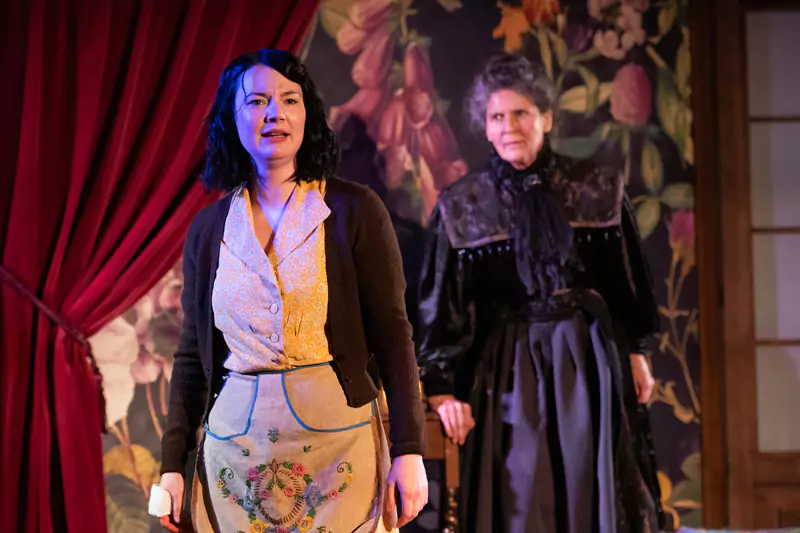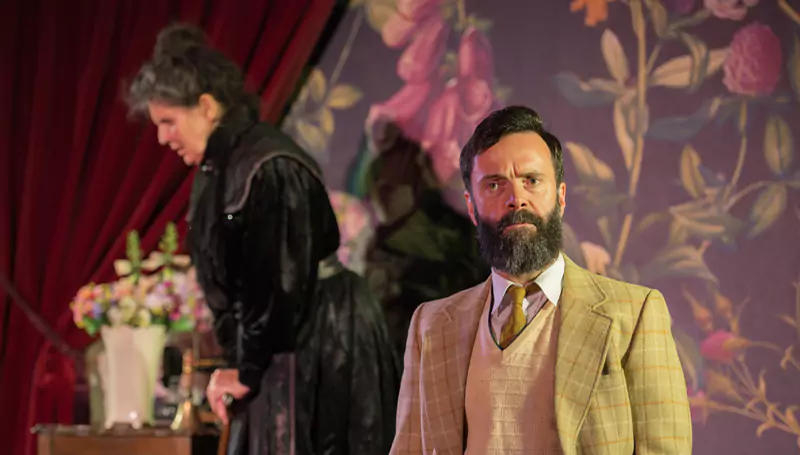“The Needle Room”, St Nicholas Church Hall, Lanark
Mark Brown in Clydesdale
23 September 2025
★★★★
The splendidly named theatre company Braw Clan has taken upon itself the task of “making new Scots language plays for rural audiences in Clydesdale and southern Scotland.” In so doing it has been inspired, perhaps, by the late John McGrath’s famous company, 7:84 Scotland, which pioneered touring theatre in Scotland’s far-flung rural communities in the 1970s.

Shannon Lynch and Fletcher Mathers.
Photo credit Alex Brady.
There can be little doubt of the need for new Scots-language theatre in 21st-century Scotland. While the revival of Scottish Gaelic – a Celtic language that suffered a long period of repression – is rightly celebrated, too little is said of the neglect of Scots (a West Germanic tongue that is a cousin to the likes of English and Dutch).
When I was a boy growing up in the southwest of Scotland in the 1970s and 1980s, it was normal for adults (from teachers to relatives) to denounce Scots words as “slang” and insist that one “speak proper English”. In Methuen’s published text of Braw Clan’s latest play – The Needle Room by Martin Travers – there is a 28-page glossary translating Scots words and phrases into English. Truth to tell, that glossary will be consulted by plenty of Scottish readers.
The drama itself played on Saturday night to a packed St Nicholas Church Hall in Lanark (a lucky 70 patrons got tickets for a sold-out tour that is currently running a waiting list). What they saw was a quintessentially well-made play set in their home town in the 1930s.
A tight three-hander, the piece plays out in the grand Lanark villa of wealthy heiress Jessie Meikle Galbraith and her son, the aspiring fascist politician (and bigoted Protestant supremacist) Duncan Galbraith. Although she shares her son’s deplorable politics, Jessie is deeply resentful and suspicious of him, as he is of her.
The uneasy trio is completed by the character of Rebecca McCrea, the Galbraiths’ young servant, who is barely tolerated by the pernicious Duncan on account of her Catholicism.
The play’s title refers to the room built at the top of the villa for the purpose of needlework. It is there that the formidable matriarch, Jessie (who is suffering agonizing pain due to the debilitating kidney condition then known as Bright’s Disease), sits working on her final quilt.
Meanwhile, downstairs, Duncan holds forth on the need for the British Union of Fascists to adopt a Protestant brand of extreme-right politics, as distinct from the “Papist” fascism of Mussolini. Rebecca, by stark contrast, awaits her much delayed pay rise, desperate, as she is, to pay for the new leg braces that will assist the walking of her beloved little daughter Alice, who has polio.
The drama may be set in the 1930s, but – with such themes as a menacing rise in far-right politics and a moral conflict over assisted dying – it is startlingly relevant. Played in a glorious, lyrical Scots, the piece bristles with inter-familial intrigues and vicious class antagonisms (not least in the bourgeois matriarch’s disdain for the life-altering injury suffered by Rebecca’s husband).
Director Rosalind Sydney’s tight, atmospheric production boasts an excellent cast. At the top of designer Jessica Brettle’s fine set – which evokes beautifully the wooden staircase that leads to the titular needle room – sits Fletcher Mathers in the role of the redoubtable Jessie. A veritable doyenne of the Scottish acting profession, Mathers gives an excellent, subtle performance as a woman of iron-cast certainties who has a brutal capacity for manipulation.
Rebecca has graduated from the school of hard knocks, as dished out by nuns with a predilection to cruelty. Shannon Lynch’s marvellous performance grasps this entirely, moving convincingly between fear (for her job and for her child), courage and cunning.
James Mackenzie impresses, too, as the loathsome, strutting Duncan, whose deviousness is laced with barely-disguised self-doubt and well-founded personal vulnerability.
Travers and Sydney weave these characters together into a compelling drama of interpersonal and class conflict. Reaching a deliciously fierce denouement, The Needle Room is a wonderfully intense credit both to Braw Clan and to Scots-language theatre.
Touring until 27 September: https://brawclan.com









